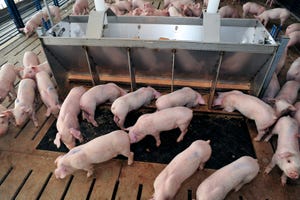13 state attorneys general file brief in support of Question 3 plaintiffs
Coalition says Massachusetts law violates the Constitution, will harm agricultural states and consumers.

Iowa Attorney General Brenna Bird and 12 other states have now voiced their opposition to Massachusetts' Question 3, in addition to California's Proposition 12. Passed by Massachusetts voters on Nov. 8, 2016, Q3 imposes confinement requirements on out-of-state pork producers and prohibits the sale of pork meat within the state from offspring of an animal confined in a manner inconsistent with Massachusetts' requirements, regardless of where in the nation the animal was raised.
The attorneys general contend that new ban will cost pork producers across the country hundreds of millions of dollars, drive many pork producers out of business, and dramatically raise pork prices. The coalition says the new ban also sets a dangerous precedent that would allow states to upend markets across the nation based on their political agendas.
“Massachusetts’s radical pork ban hogties Iowa pork producers,” said Attorney General Bird. “With these strict new mandates in effect, Iowa farmers will face extreme costs and regulations to compete in the industry, forcing many family hog farms to close shop. Massachusetts doesn’t get to dictate how Iowans farm. We are fighting to support our pork producers and protect Iowa family farms.”
In addition to harming agricultural states and consumers, the coalition says Q3 violates the Constitution. Those violations include the Dormant Commerce Clause, which gives the federal government, not state governments, the power to regulate interstate commerce. It violates the Import-Export Clause, which arguably prohibits states from imposing import regulations on products brought in from other states. Additionally, the ban violates the Full Faith and Credit Clause, which requires states to respect the laws passed in other states.
Prop 12 opposition
In August, Bird led 16 states in a letter to U.S. Congressional leadership, urging the passage of the Ending Agricultural Trade Suppression Act. The bill would prevent California from regulating farmers and ranchers across the country by preserving states’ authority to regulate agriculture within their own borders. The state attorneys general say the harsh regulations by Proposition 12 will spike prices for consumers and force many pork producers who are unable to comply with the new standards to close their businesses.
“California needs to keep their hands off our bacon,” said Bird. “No other state should be dictating how Iowans farm, let alone California’s bureaucrats. The EATS Act stops California’s overreach and gives state attorneys general the tools they need to fight for farmers and ranchers. We urge Congress to pass the EATS Act and stand up for livestock producers across the nation.”
While Q3 is similar to Prop 12—banning any uncooked whole pork meat sold in the state that does not meet specific sow housing requirements, regardless of where it was produced—Q3 goes further, not allowing the transshipment of whole pork through the state.
In August, the Restaurant Law Center, four state restaurant associations and the National Pork Producers Council reached an agreement with the Massachusetts Attorney General's Office and the Massachusetts Department of Agricultural Resources on two technical clarifications regarding the Q3 pork rules.
Under the terms of the settlement the pork rules would not apply to whole pork meat that is already in the supply chain as of Aug. 23. Also, the rules would not apply to whole pork meat that goes to distribution centers in Massachusetts, but is ultimately destined for restaurants in another state, even if a sale occurs in Massachusetts as part of the supply chain. Additionally, the Attorney General's Office has agreed not to enforce the transshipment portion of the pork rules while MDAR completes its rulemaking process.
Midwest pork producers challenge Q3
In July, a group of Midwest pork producers filed a lawsuit in Massachusetts federal district court challenging the constitutionality of state law Q3, specifically the minimum size requirements for farm animal containment.
The lawsuit, brought forth by Triumph Foods; Christensen Farms Midwest, LLC; The Hanor Company of Wisconsin, LLC; New Fashion Pork, LLP; Eichelberger Farms, Inc.; and Allied Producers' Cooperative, challenges Q3 as well as the overall constitutionality of similar laws such as Prop 12. In the May 2023 opinion on Prop 12, the U.S. Supreme Court raised concerns about other possible constitutional violations that may exist. The plaintiffs say this left the door open to address the constitutionality of laws like Q3 and Prop 12 through other claims.
"Discriminatory trade restrictions like Q3 and Prop 12 affect the ability to build resilient, reliable food supply chains across the United States," said Triumph Foods President and CEO Matt England. "They also hurt many small businesses, employees, consumers and government-funded agencies. Free and fair interstate commerce is vital for the economic prosperity of our country."
About the Author(s)
You May Also Like





